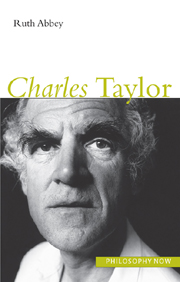3 - Theorizing politics
Summary
This chapter examines Taylor's contributions to political theory. It begins with the communitarian elements of his thought. These are, following Taylor's own advice, broken down into two types: ontological and advocacy. His long-standing critiques of negative freedom and of atomism feature prominently in the account of his communitarianism. There is a discussion of the role of shared goods in politics and of his attempt to raise awareness about the significance of the republican or civic humanist tradition in western politics. The second part of the chapter explores Taylor's complicated relationship with liberalism. It covers his defence of rights, the value he accords civil society and his critique of the idea of state neutrality. The challenges posed to traditional conceptions of liberalism by the politics of recognition are also considered. Taylor's interest in the social and political manifestations and consequences of pluralism also wends its way through this chapter.
Taylor and the communitarian tradition
When it comes to political theory, Taylor is typically characterized as a communitarian. Communitarianism is a broad philosophical approach to questions of politics, law, society and identity. When numbered among communitarians, Taylor joins a group of Anglo-American political philosophers whose better known members include Alasdair MacIntyre, Michael Sandel, Michael Walzer, Jean Bethke Elshtain and Amitai Etzioni. Philosophers as politically different as Aristotle, David Hume, Edmund Burke and Karl Marx can be considered, retrospectively at least, as contributing to the communitarian tradition.
As its name suggests, communitarianism's general concern is with the bonds of community – their importance, creation, maintenance and reproduction.
- Type
- Chapter
- Information
- Charles Taylor , pp. 101 - 150Publisher: Acumen PublishingPrint publication year: 2000



